|
Can’t we all get along? There’s plenty of wine and word count out there for everyone.
And you thought the bickering over the “clean” wine trend was exhausting. But no, the wine industry loves to fight itself, so here we go with the latest cold war: Old school wine crowd has had enough of the new school wine crowd and a Twitter battle ensues. Seriously. Are “real” cosmetic industry writers this upset about beauty influencers demonstrating their morning skincare routine on Tik Tok?
I’m not entirely sure what spurred the latest round of anti-wine-influencer articles – perhaps the fact that we are all spending a whole lot more time on our devices thanks to COVID restrictions – but something appears to have stoked the coals on the whole “wine influencers aren’t influential” argument, and I am not here for it.
While reading James Lawrence’s recent piece in Wine-Searcher.com, “The Incurable Plague of Wine Influencers,” I found myself clenching my jaw. My pulse actually quickened. I even yelled at my husband about it, as though he had somehow played a role.
In his searing critique, Lawrence writes, “More than two million people dead; massive disruption to our lives; job losses and depression – but take heart, the world's influencers have managed to keep snapping.” But, he has managed to keep writing totally unhelpful, condescending smackdowns of said influencers, has he not? In what way is this better?
He continues, “Personally, I would have thought that societies living under lockdown would have scant need for their brand of nauseating self-aggrandizement. When you're filing for divorce and claiming unemployment benefits, smug posts about banana daiquiris and Prada surely come as little comfort.” Is reading smug articles like his then supposed to serve as a panacea? Should we do away with all forms of mindless (or mindful) entertainment until the world is a better place? Did no one else binge watch Tiger King during lockdown, or was that just me? 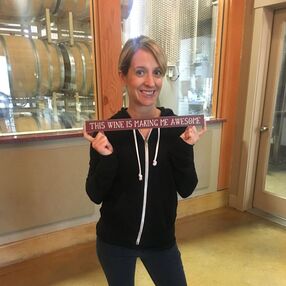 Or maybe I'm making the wine awesome. Or maybe I'm making the wine awesome.
Considering that taking stylized bottle and vineyard shots is how some influencers actually earn their living – or at least their wine money (the spending of which helps the wine industry) – these posts may very well be keeping them from having to file for unemployment.
Let’s take it one step further. If an influencer, with their eye-catching bottle shot, gets one person to head to a winery’s website to make a purchase, or follow a winery’s account on social media, or make a mental note to visit when things open back up, is that influencer not doing more for the business of wine – which has been hit pretty hard thanks to lockdown orders, as we all well know – than Lawrence is in criticizing them for taking selfies? At the very least their feed isn’t clogged with static posts talking about how terrible and useless “real” wine writers are. This isn’t a zero-sum game. It’s possible for some wine enthusiasts to exist in their grouchy and judgmental wine world, while social media stars exist in their aspirational, technicolor fantasy land, without the planet self-destructing, I promise. Both will have their fans. They may even get along if we let them. Wine writer Tom Wark’s response piece, “Stalin, the Khmer Rouge and Wine Influencers” was somewhat gentler, and certainly far more helpful. He offers practical advice for brands considering working with influencers, equating a social media post to a form of advertising. But there is still a whiff of disdain as he observes, “Most wine writers attempt to tell a genuine story. Wine Influencers attempt to find the right light.” I suppose it depends on what sort of story the consumer wants to read. I know plenty of wine lovers who spend a pretty penny on their annual wine consumption who would rather get a root canal than read certain high profile wine journals cover to cover. And, let’s be real – many people purchase wines based on interesting or striking labels, so something can still have value – and tell a story – just by virtue of being nice to look at.  Friends dining together with wine. Friends dining together with wine.
To this day, I still struggle to fully understand what the anti-influencer crowd is so up in arms about. Is it that they are worried influencers are threatening their jobs, or their place among wine consumers? The very integrity of wine itself? I’ve said it once, and I’ll say it again for those in the back: Let’s please remember that wine – while certainly worthy of in-depth discussion and analysis – is ultimately a product consumed by the majority of wine consumers for pleasure. I’m not sure writing condescending, dismissive, arrogant pieces against social media influencers seeking to promote it is helping the U.S. wine market’s cause.
Ranting to my husband aside, I’ve tried to examine why these rages against influencers make me so upset, and I think it comes down to three things:
First, the level of vitriol in some of the anti-influencer rhetoric hints at the ongoing sexism within the wine industry. The wine influencers that tend to be referenced in these pieces are indeed female, and it feels like their work – again, as hard as it is for some people to believe, this is how many of the best of them make a living – is being undermined by men. The narrative also often fails to recognize the breadth and diversity of wine influencers out there, lumping the educational in with the irreverent, and the irreverent in with the aspirational-lifestyle-driven… and ultimately dismissing them all. 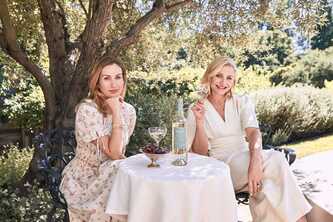 Cameron Diaz & Katherine Power toast their influence. Cameron Diaz & Katherine Power toast their influence.
Secondly, once again, the old guard of the wine industry is stubbornly refusing to meet consumers where they are. I watched a session at the recent Direct to Consumer Wine Symposium led by brilliant industry veteran Brian Baker in which he asked consumer panelists how they felt about wine ratings and where they got their wine information. Most said scores didn’t influence their wine-buying decisions. One panelist specifically referenced looking on social media for wine recommendations. She even mentioned gravitating to – gasp! – Cameron Diaz’s new wine brand (and the industry’s punching bag du jour) “Avaline” because of how engaging the content promoting it on social media was. Granted this was a small sample size, but it doesn’t take a statistician to take one look at the past few state of the industry reports and realize more needs to be done to capture and engage new and younger wine audiences.
And, lastly, the criticism isn’t solutions-oriented. These missives never feel inclusive and helpful, nor do they give the supposed offenders a chance to do better. These articles just feel like a worse form of preaching to the choir – whining to people who look and sound like you, and already agree with you.
One day, when social media influencers have been eclipsed by the next shiny new thing, I hope they will have the adaptability to prolong their relevance to the industry… or at the very least the class to support others who are trying to keep wine flowing into glasses. That’s what we’re all here for, right? A (Hopefully Helpful) Epilogue
A few months ago, I admittedly got a bit disenchanted with wine influencers as well, based on a few negative experiences working with them, and almost did an online rant of my own.
However, in reflecting on this disenchantment, I don’t think I was mad at the institution of the influencer, but merely the lack of professionalism of a few individuals who also happened to be influencers. As a business owner, a freelance writer, and PR and marketing professional, I have experienced the same frustrations working with journalists, partners, vendors and beyond, so the bad behavior isn’t unique to the well-lit selfie set. But, this piece is about influencers so, in the spirit of solutions-based writing, I would like to offer influencers a few tips on how to work best with brands and PR firms, and hopefully stave off some of this criticism from the other side… that is, if they even care to.
8 Comments
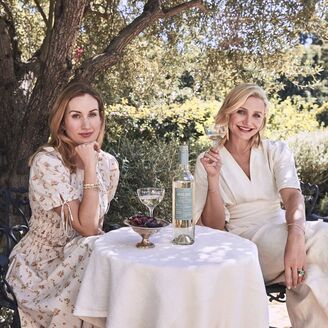 Cameron Diaz & Katherine Power, Aveline Founders, photo credit: Justin Coit Cameron Diaz & Katherine Power, Aveline Founders, photo credit: Justin Coit You’d think some White-Claw-Drinking “influencer” had just come out with a Hitler-themed wine brand with the amount of hate pieces that cropped up after Cameron Diaz & Katherine Power launched their new “clean” wine brand, Avaline. I don’t think I’ve seen this level of vitriol since the Court of Master Sommeliers scandal. From Vinography’s “Clean Wine is a Commercial Scam” to The Guardian’s “The Goopification of wine: why ‘clean wine’ is a scam,” and the widespread supportive sharing of these pieces among the wine industry’s own set of A-listers, it’s clear that people are ANGRY. But WHY? Vinography points out that, “Avaline wines are actually just commercially produced organic wines that have several more additives than many small-production winemakers would consider using.” While this may be true, then why aren’t these small production winemakers banging the gong about their wines? Why are we mad at the ones who saw the marketing opportunity and ran with it, instead of ourselves for not perceiving the potential threat and preempting it, like any good business would? Should we not be asking why the wine industry itself isn’t taking every opportunity possible to fight back against other competitors in the beverage space, and capture the hearts and minds of new wine drinkers, by educating the public about why and how wine in general is the ultimate natural beverage? But then this is the very thing wrong with the wine industry. We would rather dig in on our traditions and pride than actually get out of our comfort zone and innovate. Should we not be asking why the wine industry itself isn’t taking every opportunity possible to fight back against other competitors in the beverage space, and capture the hearts and minds of new wine drinkers, by educating the public about why and how wine in general is the ultimate natural beverage? 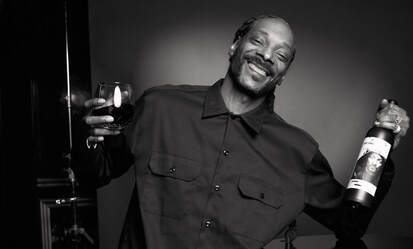 Snoop Dogg living his best wine life. Image from DrinksTrade.com Snoop Dogg living his best wine life. Image from DrinksTrade.com Clean wines are derided as nothing more than marketing gimmicks aimed at the “wellness obsessed,” at least so says a well-known wine journalist whom I respect and admire. But I find myself asking, so what? What do you think slapping an augmented reality label on the bottle and partnering with Snoop Dogg is? What do you think Jean-Charles Boisset’s ambassador program is? Is anyone outraged by House Wine partnering with Cheez-Its for the ultimate wine/snack duo? Actually, don’t answer that. I count myself as someone who is wellness…focused. I work out between five and seven days per week. I try my best to eat well, opting for whole grains, fruits and vegetables, and lean protein where possible, but also not shying away from fried chicken, bacon, chocolate, and the occasional fast food indulgence. And I have also dedicated the last 15 years of my life to the study of wine. I take some offense to being dismissed as someone who can’t possibly be serious about wine if I am also serious about taking care of my physical and mental health. I have been very outspoken about the culture of over-consumption and risky behaviors that pervade the wine industry, regularly questioning if we drink too much in this drinks business. To see any brand – whether they’ve earned their stripes or not – bringing to market a product that at least starts to address themes of wellness and transparency is encouraging.
Let’s also not forget that the wine industry created this problem to begin with. By not requiring wines to have ingredients labels on them – regardless of which side of the aisle you’re on when it comes to that battle – our very industry set up a status quo that practically rolled out the red carpet for enterprising winemakers and marketers to fill a need on behalf of consumers asking these questions. And, by not making the effort to educate consumers on why ingredients labeling on wine may or may not be necessary, we have added fuel to this fire. Imagine if the wine industry had actually come together for once to create an entertaining and inclusive large-scale educational campaign to explain, in layman’s terms, things like how many of the additives allowed in wine are often precipitated out and thus no longer really “in” the wine as an ingredient. What if we had taken real steps to show fearful consumers that “Mega Purple” – which may sound horrifying and possibly chemical to the likes of Power and Diaz – is simply super concentrated, high sugar grape juice, even if you as a winemaker choose not to use it? We have missed a huge opportunity here to engage the consumer, and, in the meantime, other entrepreneurs got there first, and actually met inquiring and aspiring wine drinkers where they are.  "Oh I don't drink anything that casts a shadow." Photo by iiii iiii from Pexels "Oh I don't drink anything that casts a shadow." Photo by iiii iiii from Pexels The way I see it, if brands like Avaline, FitVine, Dry Farm Wines, or Scout & Cellar get Chad from the gym who benches 350 lbs, carries around one of those plastic gallon jugs of water wherever he goes, and usually only drinks Michelob Ultra with his other bro-y dudes to check out the wine space, everyone wins. If it gets hipster Sienna who prefers hard Kombucha, single-origin pour-over coffee, and CBD to give the wines a taste, everyone wins. Isn’t the goal to expand the wine market, not shrink it out of exclusivity? I just browsed through a fascinating twitter thread kicked off by VinePair’s Erica Duecy, who asked her network “What is the biggest threat facing the wine industry right now?” So many sharp minds in the biz weighed in, listing things like “Baby Boomer attrition” and “Lack of speed/interest to adapt,” and ”Apathy…on the part of producers who believe (and are encouraged to believe by some media) that they have the right to exist w/o changing”. Jacqueline Coleman’s observations were particularly spot on. She cites “An inability to accept curious consumers who aren’t ‘experts’” as one of the biggest threats right now, noting that, “The industry in general is still very stuck in its ways, & losing potential newbies fast by being judgmental & cranky about every new thing.” PREACH, sister. So WHY are we still seeing hate pieces about every new brand that comes out with something offbeat or, dare I say it, gimmicky? I saw at least one of Erica’s respondents share one of the anti-clean wine stories. It’s belittling to consumers who may be branching out into wine for the first time, as well as to long-time wine lovers who want to try something different, lapel pin or not. Don’t bite the hand that feeds you, I say. Wunderkind sommelier Victoria James made some brilliant points in her piece for Esquire, “Celebrities Could be Making Good Wine. Instead, They’re Making Bad Wine for Good Money.” Her articulate push for celebrities to use their influence for more meaningful pursuits in climate change, social and racial justice, and politics, when creating their wine brand made me openly swoon. She also observed that wine, “Can express a taste of terroir, a somewhat mystical term that describes a sense of a place. The simplicity of this notion is what makes it so sacred.” Perhaps this is where she and I diverge. While I agree with her wholeheartedly on the beauty of the history, traditions, climate, and agriculture that make up a spectacular wine, I believe wine’s sacredness as a whole lies in so many other things: namely, that it is a product of pleasure that has the power to bring people together, and provide a social lubricant that enables conversation, intimacy, and moments of joy. She goes on to note that the wines that celebrities lend their names to, “Seem to avoid exploring this idea of terroir [Don’t tell Alecia Moore/AKA Pink!], and instead fall prey to marketing teams who favor the lifestyle categories of wellness and luxury, as viticulture and vinification methods take a back seat.” I suppose I would ask… but what is wrong with this? Does being a celebrity who wants to create a wine brand necessitate speaking of terroir in order to appeal to the consumer? I have personally watched people glaze over during wine events I have hosted for everyday consumers when I start waxing poetic about this exposition or that soil type. Some of the biggest wine brands out there, regardless of how you feel about them, wouldn’t know terroir if it goosed them at a party. And that’s not a bad thing. Can we not have the Chateau Margauxs and Screaming Eagles and Quintarellis – and celebrate everything extraordinary about those wines – but also have the other stuff too? The stuff for those who just want a glass of something that aligns with their needs, wants and aspirations, whatever, whenever, and why-ever those might be? Context is everything in life and in wine.
Let the terroirists have their dirt and drink it too. But let everyone else who just wants to drink some wine with some friends do so without feeling like they are getting it wrong, even if it’s a bottle of Skinnygirl Pinot Grigio. If this industry is ever going to survive, we are all going to need to be able to play in the same sandbox (sandy loam box?). Who knows, we may even learn a thing about sharing – or terroir – while we’re at it. 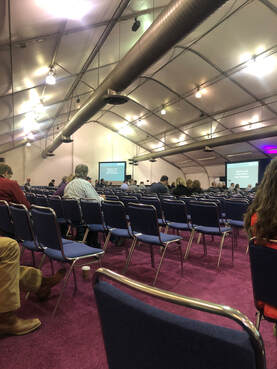 Industry information being presented to a near-empty room at the 2020 Unified Wine & Grape Symposium Industry information being presented to a near-empty room at the 2020 Unified Wine & Grape Symposium I just got back from this year's Unified Wine & Grape Symposium, North America's largest industry expo and trade show. I have been going for a few years now, and I always come home feeling energized and excited about the industry I have been a part of for nearly twenty years. However, this year, I left feeling a little bit, well, sad. It may have been the fact that the temporary relocation of the event to Cal Expo -- presumably an amazing place during the California State Fair, for which the venue is intended, but not ideal for this particular event -- made this year's Symposium feel disjointed and cold (literally and figuratively). Sessions were sparsely attended and, at least for me, the magical sense of community I normally feel at this event just wasn't there. This was perhaps a result of the sheer magnitude of Cal Expo -- walking between sessions felt like trekking across a massive college campus to your next class. But I'm worried it was also because of something else... something that I'm hoping to put into words here... I left last year's Symposium worried for our industry, but also excited about the opportunities ahead. I reported on my key learning (singular) last year with a simple warning: Adapt or die. There felt like the beginnings of some momentum. Many nodded their virtual heads in agreement. The mirror was held up to us during the many 2019 breakout sessions and keynote addresses. We observed, took note, welcomed advice. We had our marching orders and were sent away to execute. And yet we didn't. This year, more than once, I found myself swearing I had seen that exact same presentation slide last year. The one about millennials being important, and the wine industry needing to figure out how to communicate with and to them. The one about alcoholic beverages moving into new occasions and how we need to meet consumers where they are -- movie theaters, axe throwing, the beach... The one about new packaging. The one about how important experiences are. The one about the next creeping competitor -- last year it was cannabis; this year it was White Claw. We heard again this year about transparency and authenticity and labeling. About how critical it is that we figure out how to deliver better, faster and more engaging direct-to-consumer capabilities. It's not that we aren't doing any of it. It's that this should all by now be automatic to us as an industry keeping up, not revelations worth re-reporting. While I was delighted that a few speakers dug deeper on themes of health and wellness, and urged our industry to take wine back as the original natural beverage -- a brilliant take on and response to the unnerving sober curious movement -- and an emphasis on using the data that is already there for us to do better, smarter, more consumer-focused business, there was little else that felt new. Perhaps I was being naive, but I truly believed after last year's wake-up call that we would have all been spending this Symposium celebrating the incredible moves we had made in 2019. How we had started to take some steps to move back into a leadership position in the world of alcoholic beverages. Created our own White Claw juggernaut.
Instead, it always feels like we are playing catch-up. Defense. Reacting to the industry and competitive sectors, but no longer setting the standard ourselves. Since we grabbed onto the French Paradox all those years ago and ran with it, we have languished. And that paradox can no longer carry us alone. I don't blame any of the speakers or panelists. The sessions I sat in on were polished, well-presented and engaging, and I left with plenty of ideas and inspiration. I blame us collectively -- myself included -- for going home last year and falling back into the predictability of business as usual, and for maybe being tempted to do so again this year. There are some out there setting the pace and pushing the boundaries of what this industry is capable of. But there are too many of us waiting for others to take the lead, hoping we can get on the bandwagon when the time feels safer to do so. As a PR professional, a marketer, and a writer in this industry, I pitch and engage with hundreds of stakeholders at various levels all year. I had the immense joy of creating a few "transformational" proposals for new business to potential clients this past year -- clients who were specifically looking for something out of the box -- all of which were, sadly, turned down. "We're just not ready... maybe in 2021," I heard. Perhaps I'm not the one to execute on these wild concepts. But it seems like no one else is either. Instead, the majority of us stay where we are comfortable -- with our vineyard shots, and our yawn-inducing tasting notes, and our walk-around wine events. Again, we are talking to one another, instead of the world of consumers out there that we need to either win over, or keep in our corner. And so I am putting this out there to all of you wine misfits and visionaries: If you want to do something different, let's talk. This isn't a business pitch; it's a plea to collectively think outside the box. Get uncomfortable. Take some risks. Solve some problems. No one individual or brand can do it alone, but I suspect a few of us can make a dent. Let's sit with a glass of wine and figure out how we can spend next year's Symposium celebrating the great comeback story of the wine industry. I drink every day. Almost without exception.
It is part of my daily ritual... in some ways part of my identity. And it brings me great pleasure. At the end of the day, when I close my laptop, I love to open a bottle of something white and crisp. I turn on music, cook dinner, watch my kids play (or fight), and take in the life I have built. Sometimes these reflections are joyful. Sometimes they are frustrated and tired. Either way, I view this moment in my day as a great one. When I serve dinner, I tend to pour myself and my husband something red. I often sip this throughout the night, sometimes even taking the last few mouthfuls to bed with me as I watch a favorite show or finish up work or mindlessly scroll through my phone, enjoying those few moments to myself. A lunch or dinner among friends without wine seems like a missed opportunity to me. Not to catch a buzz, but to go back in time, connect with the land, and experience multi-sensory pleasure. Wine is a fantastic accompaniment to food, a wonderful social lubricant, and a small mechanism for making an ordinary moment feel extraordinary. Is it the only way? Of course not. But it's a nice way, an age-old way, and that way is currently taking a beating. And, for the first time, writing this down suddenly feels like a guilty confession. I am actually bracing for an onslaught of negative commentary after hitting "publish" on this one. As the ubiquitous and well-intended "Dry January" -- something in which I have never participated -- comes to a close, and I take stock of all the pro/con articles about it out there, as well as the informal documentation on social media from those on the wagon for the past near 31 days, I find myself feeling protective of my beloved drink. My wine. My industry. I find myself asking... when did this happen? When did everything change? When did behaviors on the extreme ends of consumption start to determine the go-forward plan for everyone? “We’re putting an ingredients label on our packaging,” the full-page ad in a Sunday edition of the LA Times reads. “Because it’s the right thing to do. Because you deserve to know your beer’s ingredients.” It’s an ad for Bud Light. Not a small-production craft beer, which one might expect to tout this sort of credential. But for “America’s favorite light lager,” the stuff of college parties and tailgating. The beer giant also put out a press release announcing the move. In the months following, a heated debate about what should and shouldn't be included in the labels of our favorite adult beverages has been brewing (pardon the pun). 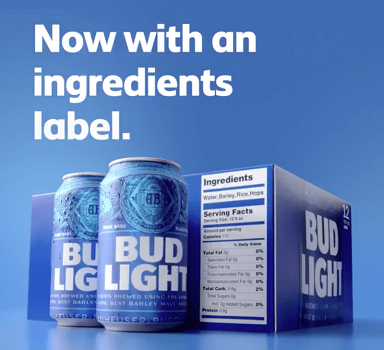 Bud Light takes a stand on ingredients labeling. Photo: Twitter @BudLight Bud Light takes a stand on ingredients labeling. Photo: Twitter @BudLight Ingredients labeling has become the norm in the food industry because it’s required by the FDA. However, to date, the adult beverage industry does not require ingredients to be listed or nutritional information outlined on labels unless a specific health claim is being made such as “low carb” or “low calorie.” In fact, current law allows for a laundry list of additives -- some of which sound, well, distinctly chemical, that can be used but don't need to be included on the label. While we are seeing the occasional brand volunteer these details, there are no current regulations requiring alcohol brands to go beyond the basics on their labels. This includes the wine industry.
It’s one thing to list “water, barley, rice, hops,” on your packaging in the name of transparency, as Bud Light has now promised to do. But what if your ingredients include things that are barely pronounceable, even if they are essential parts of the winemaking process and totally natural? As consumers increasingly demand not only transparency, but food made from ingredients that don’t look like they belong in a lab, how does the wine industry stand to fare? The issue is clearly a sensitive one. Another Unified Wine & Grape Symposium under the belt. The conference -- which attracts 14,000 attendees each year making it among the largest trade shows in North America -- had a different feel to it this year. It wasn't that the programming varied much. The sessions on winemaking and business and marketing were all there, as were the giant expo and the keynote addresses. But, I'd be lying if I said there wasn't an ominous element of -- dare I say it? -- foreboding that served as a backdrop for what normally feels like an upbeat gathering? Around this time, I usually try to do a round-up of key trends and interesting insights that cropped up throughout the three-day event. In fact, this article actually started out as a Top 5 Takeaway piece. But this year, so much of it felt like noise distracting me from the one point that rang through like a gunshot in a crowded space. Adapt or die. That’s it, folks. And here’s why: Attention to detail. As a business owner — especially in the hospitality space — this should be a huge priority. How many of you can truly say you’re paying attention?
There are nearly 10,000 wineries in the United States, most of which have tasting rooms or offer some sort of consumer experience. In an industry that can at times feel constrained by tradition and etiquette and a constant undercurrent of judgement, it may seem hard for a winery to break out of the mold and explore new ways to engage with their customers. What does it take to stand out? I visit countless tasting rooms a year. Here are some interesting moves I’ve come across in my travels that have made my visit truly memorable. I’m about to say something that could make me very unpopular among my colleagues.
Do we really need to drink so much in this drinks business? Hear me out. Ask anyone who knows me how I feel about the consumption of alcohol — specifically wine — and they will likely describe me as an enthusiastic imbiber. No matter the time of day, I rarely turn down a tipple. In fact, I often can’t remember the last time I literally had ZERO alcohol in my day. My evenings and sometimes days include wine, as I do firmly believe in wine’s rightful place during a meal…and while preparing said meal… and of course while patting one’s full belly while reclining on the couch after said meal…and…and… But, the more I have been thinking about the balance between the industry I am so passionate about — wine — and my other area of interest — wellness — I find myself wondering what responsibility we have as wine (or beer, or spirits) professionals to drink better. What do I mean by this? |
AuthorDevin Parr writes about wine -- drinking it, making it, life with it, traveling for it and the business of it. She also dabbles a bit in careers and parenting. Archives
January 2021
Categories
All
|
Company |
|

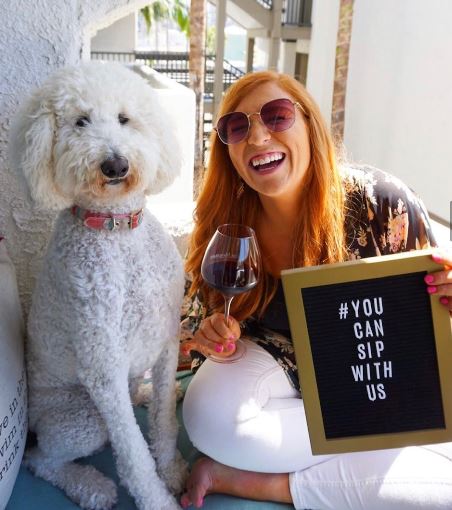
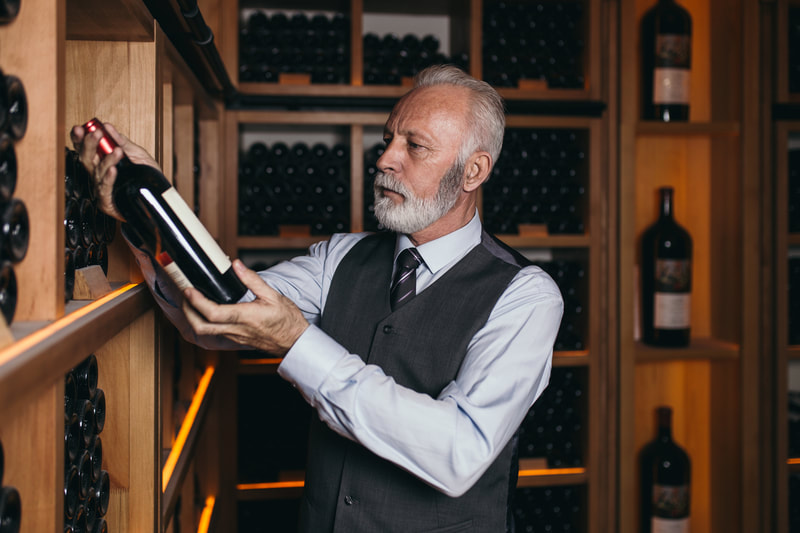
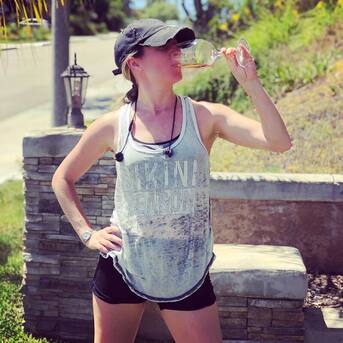
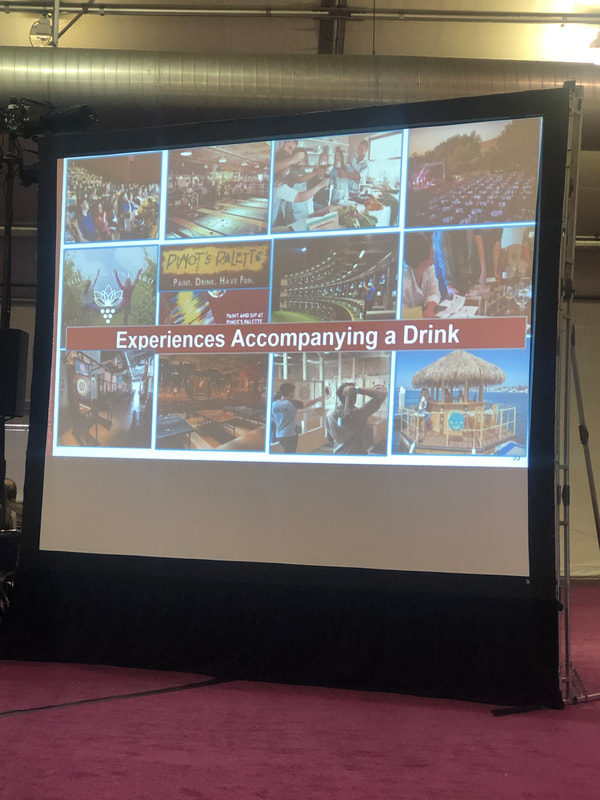
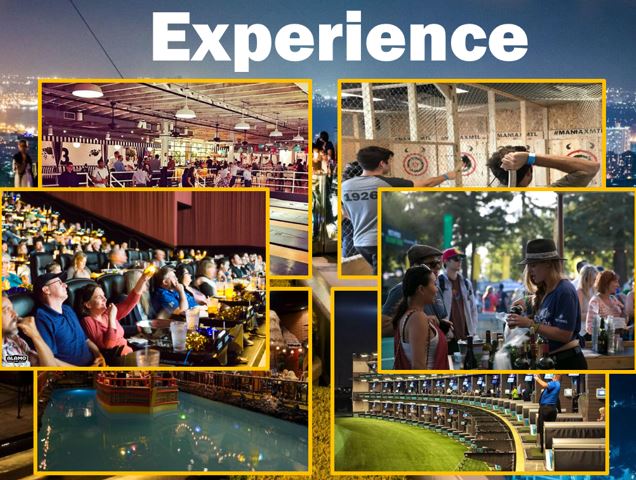
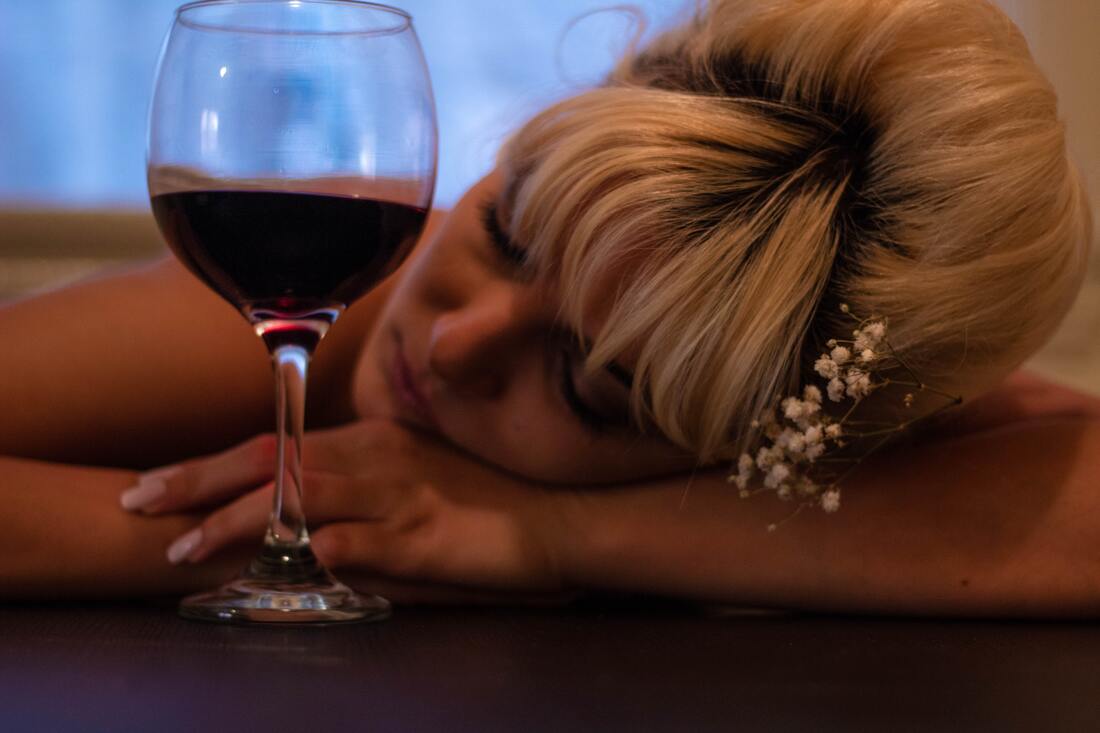
 RSS Feed
RSS Feed